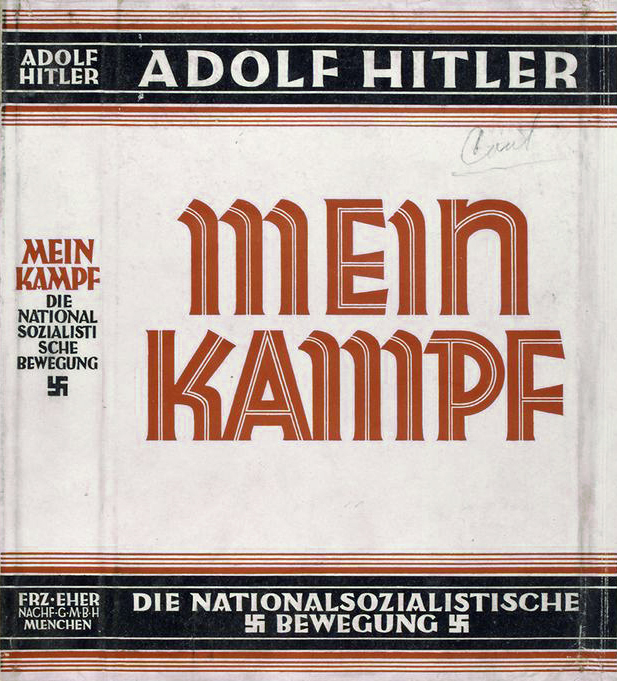
Mein Kampf
Mein Kampf (German: [maɪn ˈkampf]; lit. 'My Struggle') is a 1925 autobiographical manifesto by Nazi Party leader Adolf Hitler. The work describes the process by which Hitler became antisemitic and outlines his political ideology and future plans for Germany. Volume 1 of Mein Kampf was published in 1925 and Volume 2 in 1926.[1] The book was edited first by Emil Maurice, then by Hitler's deputy Rudolf Hess.[2][3]
"My Struggle" redirects here. For other uses, see My Struggle (disambiguation).Author
German
18 July 1925
13 October 1933 (abridged)
1939 (full)
720
978-0395951057 (1998 trans. by Ralph Manheim)
943.086092
DD247.H5
Hitler began Mein Kampf while imprisoned following his failed coup in Munich in November 1923 and a trial in February 1924 for high treason, in which he received a sentence of five years. Although he received many visitors initially, he soon devoted himself entirely to the book. As he continued, he realized that it would have to be a two-volume work, with the first volume scheduled for release in early 1925. The governor of Landsberg noted at the time that "he [Hitler] hopes the book will run into many editions, thus enabling him to fulfill his financial obligations and to defray the expenses incurred at the time of his trial."[4][5] After slow initial sales, the book became a bestseller in Germany following Hitler's rise to power in 1933.[6]
After Hitler's death, copyright of Mein Kampf passed to the state government of Bavaria, which refused to allow any copying or printing of the book in Germany. In 2016, following the expiry of the copyright held by the Bavarian state government, Mein Kampf was republished in Germany for the first time since 1945, which prompted public debate and divided reactions from Jewish groups. A team of scholars from the Institute of Contemporary History in Munich published a German language two-volume almost 2,000-page edition annotated with about 3,500 notes. This was followed in 2021 by a 1,000-page French edition based on the German annotated version, with about twice as much commentary as text.[7]
Title
Hitler originally wanted to call his forthcoming book Viereinhalb Jahre (des Kampfes) gegen Lüge, Dummheit und Feigheit (Four and a Half Years [of Struggle] Against Lies, Stupidity and Cowardice).[8] Max Amann, head of the Franz Eher Verlag and Hitler's publisher, is said to have suggested[9] the much shorter "Mein Kampf" ("My Struggle").
The arrangement of chapters is as follows:
Later analysis
The critic George Steiner suggested that Mein Kampf can be seen as one of several books that resulted from the crisis of German culture following Germany's defeat in World War I, comparable in this respect to the philosopher Ernst Bloch's The Spirit of Utopia (1918), the historian Oswald Spengler's The Decline of the West (1918), the theologian Franz Rosenzweig's The Star of Redemption (1921), the theologian Karl Barth's The Epistle to the Romans (1922), and the philosopher Martin Heidegger's Being and Time (1927).[40]
Criticism by translators
A number of translators have commented on the poor quality of Hitler's use of language in writing Mein Kampf. Olivier Mannoni, who translated the 2021 French critical edition, said about the original German text that it was "An incoherent soup, one could become half-mad translating it," and said that previous translations had corrected the language, giving the false impression that Hitler was a "cultured man" with "coherent and grammatically correct reasoning". He added "To me, making this text elegant is a crime."[7] Mannoni's comments are similar to those made by Ralph Manheim, who did the first English-language translation in 1943. Mannheim wrote in the foreword to the edition "Where Hitler's formulations challenge the reader's credulity I have quoted the German original in the notes." This evaluation of the poor quality of Hitler's prose and his inability to express his opinions coherently was shared by William S. Schlamm, who reviewed Manheim's translation in The New York Times, writing that "there was not the faintest similarity to a thought and barely a trace of language."[41]
Notes
Bibliography
Further reading
Online versions of Mein Kampf